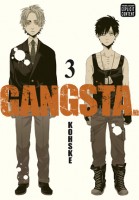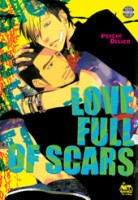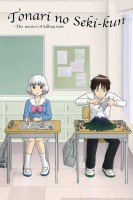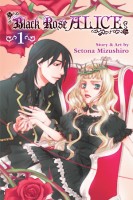My News and Reviews
So, as I briefly mentioned in my anniversary post this morning, my partners and I very recently became parents. We all ended up spending most of last week at the hospital; needless to say I was a bit preoccupied. But everyone is happy, healthy, and at home now, so everything’s good. Thankfully, I already had a couple of posts typed up and ready to go. Otherwise, it would have been a very quiet week here at Experiments in Manga since I didn’t get much reading or writing done at all. (For some reason.)
Anyway, I did somehow manage to post two reviews last week! First up was Denise Schroeder’s wonderful, delightful, and charming short comic Before You Go. The review is the latest installment in my Year of Yuri monthly manga review project, which focuses on manga and other comics with lesbian and yuri elements. Also reviewed last week was Jamie Lynn Lano’s memoir The Princess of Tennis: My Year Working in Japan As an Assistant Manga Artist. It’s a very interesting and informative book about the manga industry and Japan. The book can currently be purchased through Sparkler Monthly’s Distro program.
Despite being rather busy last week, I did come across a few things online that made for interesting reading. At Manga Connection, Manjiorin wraps up her Swan review project. The fourth Manga Studies column at Comics forum has been posted, focusing on Ishiko Junzō and gekiga. Joe McCulloch has a piece on the early work of Ryōichi Ikegami at The Comics Journal. Mangabrog has a translation of a conversation between Usamaru Furuya and Inio Asano. Also highly recommended is Comics Alliance’s interview with Vertical’s Ed Chavez.
Quick Takes
 Gangsta, Volume 3 by Kohske. As can probably be inferred from the cover, much of the third volume of Gangsta delves into the pasts of Nic and Worick, how they met, and their somewhat complicated relationship with each other. In the process more is revealed about the history of Ergastulum and the Twilights, too. Gangsta is a very violent series. Even when Nic and Worick were young they found themselves surrounded by death in a harsh environment of political turmoil. In the case of Nic, he was being kept by a mercenary group hired to act as bodyguards to Worick’s family; he’s done plenty of killing of his own. He apparently has always been somewhat terrifying. The beginnings of Nic and Worick’s exceptionally close connection are seen in this volume. Neither of them come from a good family situation, both of them are seen as socially unacceptable (Nic because he’s a Twilight, Worick because he’s a bastard son), and both of them are physically abused by those who should care about them. Though they get off to a rough start, the two broken young men are able to find some solace in each other’s company. Nic and Worick fascinate me; I’m glad to have gotten more of their backstory in the third volume. I’ve enjoyed Gangsta from the very beginning and continue to do so.
Gangsta, Volume 3 by Kohske. As can probably be inferred from the cover, much of the third volume of Gangsta delves into the pasts of Nic and Worick, how they met, and their somewhat complicated relationship with each other. In the process more is revealed about the history of Ergastulum and the Twilights, too. Gangsta is a very violent series. Even when Nic and Worick were young they found themselves surrounded by death in a harsh environment of political turmoil. In the case of Nic, he was being kept by a mercenary group hired to act as bodyguards to Worick’s family; he’s done plenty of killing of his own. He apparently has always been somewhat terrifying. The beginnings of Nic and Worick’s exceptionally close connection are seen in this volume. Neither of them come from a good family situation, both of them are seen as socially unacceptable (Nic because he’s a Twilight, Worick because he’s a bastard son), and both of them are physically abused by those who should care about them. Though they get off to a rough start, the two broken young men are able to find some solace in each other’s company. Nic and Worick fascinate me; I’m glad to have gotten more of their backstory in the third volume. I’ve enjoyed Gangsta from the very beginning and continue to do so.
 Love Full of Scars by Psyche Delico. Okay. So, Love Full of Scars is a collection of utterly ridiculous and absurd boys’ love stories. The over-the-top humor certainly won’t be to every reader’s taste, but I loved the volume. Though I largely enjoyed all of the short manga included in Love Full of Scars, my favorite was probably the titular story. (It also happens to be the longest, with several chapters devoted to it and side stories of its own.) Kanda is a high school punk who has a crush on Uesaka, the school’s biggest badass. The problem is that every time Kanda tries to confess his feelings, he ends up picking a fight instead. Fortunately, Uesaka is able to see through all of Kanda’s posing. They’re both delinquents so more often than not communicating with their fists and punching each other in the face helps them to solve their differences. The sex in Love Full of Scars, when and if it actually happens, usually ends up being rather awkward and incredibly earnest at the same time. The stories in the collection generally avoid the stereotypical seme/uke dynamics of the boys’ love genre. There is also a bit of a fixation on facial and body hair. And, well, pubic hair, too, for that matter. (Granted, that’s mostly for the sake of gag.) The manga is rough, rude, and raunchy, but I found it to be highly amusing and entertaining.
Love Full of Scars by Psyche Delico. Okay. So, Love Full of Scars is a collection of utterly ridiculous and absurd boys’ love stories. The over-the-top humor certainly won’t be to every reader’s taste, but I loved the volume. Though I largely enjoyed all of the short manga included in Love Full of Scars, my favorite was probably the titular story. (It also happens to be the longest, with several chapters devoted to it and side stories of its own.) Kanda is a high school punk who has a crush on Uesaka, the school’s biggest badass. The problem is that every time Kanda tries to confess his feelings, he ends up picking a fight instead. Fortunately, Uesaka is able to see through all of Kanda’s posing. They’re both delinquents so more often than not communicating with their fists and punching each other in the face helps them to solve their differences. The sex in Love Full of Scars, when and if it actually happens, usually ends up being rather awkward and incredibly earnest at the same time. The stories in the collection generally avoid the stereotypical seme/uke dynamics of the boys’ love genre. There is also a bit of a fixation on facial and body hair. And, well, pubic hair, too, for that matter. (Granted, that’s mostly for the sake of gag.) The manga is rough, rude, and raunchy, but I found it to be highly amusing and entertaining.
 Tonari no Seki-kun: The Master of Killing Time directed by Yūji Mutoh. The anime adaptation of Takuma Morishige’s manga series My Neighbor Seki had completely slipped under my radar until Vertical announced that it had licensed the manga. My curiosity was piqued, so I decided to watch the anime while waiting for the manga to be released. The anime was an absolute delight; I wish there was more! I’m definitely looking forward to reading the manga next year. The premise of the series is disarmingly simple. Yokoi and Seki sit next to each other in the back of their high school classroom. But instead of studying, Seki occupies himself at his desk in all sorts of ways, messing around with erasers, shogi pieces, knitting, and so on. The scenarios are actually all very imaginative, creative, and elaborate. Try as she might, Yokoi can’t help but be caught up whatever it is Seki is doing, so she doesn’t get much studying done, either. The anime is much more entertaining than I’ve probably made it sound. Each episode is under eight minutes and they are all very funny. There is very little dialogue in the series. Instead, the narrative relies very heavily on Yokoi’s internal monologue. Yokoi’s voice actress, Kana Hanazawa, does a fantastic job with the role—she is exceptionally dynamic and expressive.
Tonari no Seki-kun: The Master of Killing Time directed by Yūji Mutoh. The anime adaptation of Takuma Morishige’s manga series My Neighbor Seki had completely slipped under my radar until Vertical announced that it had licensed the manga. My curiosity was piqued, so I decided to watch the anime while waiting for the manga to be released. The anime was an absolute delight; I wish there was more! I’m definitely looking forward to reading the manga next year. The premise of the series is disarmingly simple. Yokoi and Seki sit next to each other in the back of their high school classroom. But instead of studying, Seki occupies himself at his desk in all sorts of ways, messing around with erasers, shogi pieces, knitting, and so on. The scenarios are actually all very imaginative, creative, and elaborate. Try as she might, Yokoi can’t help but be caught up whatever it is Seki is doing, so she doesn’t get much studying done, either. The anime is much more entertaining than I’ve probably made it sound. Each episode is under eight minutes and they are all very funny. There is very little dialogue in the series. Instead, the narrative relies very heavily on Yokoi’s internal monologue. Yokoi’s voice actress, Kana Hanazawa, does a fantastic job with the role—she is exceptionally dynamic and expressive.






